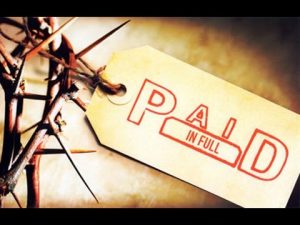
We were bought at a high price (1 Cor 6:20; 7:23). And now as Christ followers, we do not belong to ourselves (1 Cor 6:19). Rather, we deny ourselves (Mt 16:24) and we die to ourselves (Jn 3:3-6), making no provision for the flesh (Rom 13:14). We have no rights over ourselves as if we were sovereign beings in control of our lives, demanding this and that. Our rights as newly created beings emanate from His being and His flourishing commands. We are entitled to nothing of ourselves but we are entitled to everything that belongs to Christ, His inheritance.
When we understand that we have been predestined to obtain a godly inheritance (see Eph 1:11), we are free to live the abundant life we were created to enjoy as slaves of righteousness. The fallacy is believing there’s a tertium quid or a third/intermediary option, when it comes to personal identity.
Let us not be disheartened as we see the world prosper, touting its righteous acts of self-grandeur and self-importance apart from God. We are either slaves to sin or slaves to righteousness (see Rom 6:16). It offends our self-perpetuated dignity as rational creatures to relinquish control to anyone, and thus being God’s slaves is out of the question. The fallacy is believing God is a Draconian deity because He is completely sovereign.
Naturally speaking, we desire autonomy and crave independence. We hunger for self-governance and thirst for freedom without responsibility. But what if true freedom is enslavement to righteousness? What if our true identity were purchased at the highest price possible, ransomed with all the riches and glory in heaven?
The other fallacy is to believe that we do not have a voice, since we have been bought at a price. Yes, it’s true, we do not have rights of our own or to ourselves over our own bodies as if self-harm were an option. Only the sanctifying blood of Christ could bleach out the stain of self-hatred.

But that does not mean that we are voiceless. We are free to express ourselves, fulfilling our identities and destinies as children of God. We, of all people, should be deeply grieved at the injustices of this world, crying louder and pounding harder with God’s gavel of justice against the default ethic that now invades the church–“the greatest good for the greatest number of people,” which is at odds with Christ’s teaching of rescuing and celebrating one sinner over and above the righteous herd (Lk 15:3-7).
Paradoxically, (divinely empowered) self-expression is a balm that soothes our spirit as we suffer self-denial, and persecution for Christ is an empowering ointment that heals the hurts of a spiritually war-torn warrior’s soul. Our voices, individually and collectively, humanize us. They serve as thorns in the flesh of injustice and as splinters in the minds of our persecutors.
Our ecumenical voices, which rap on God’s chamber door, become all the more sweet to His nostrils in those painful and perplexing moments when we use them as a self-sacrifice to empower the weak at our expense and to overcome evil with good (see Rom 12:21) as we speak truth in love (Eph 4:15) and love those who speak untruth about us (Mt 5:44; Lk 6:27).
Surrender all to Christ and live for Him alone, and the stench of entitlement will have nowhere to breathe. The daily sacrifices we make in the Spirit to the flesh fail to go quietly into the night. The flesh rages against the Spirit and the Spirit against the dying of the light.
Be a voice with no rights. Deny yourself. Make no provision for the flesh. Count the cost of discipleship.

122619/052621